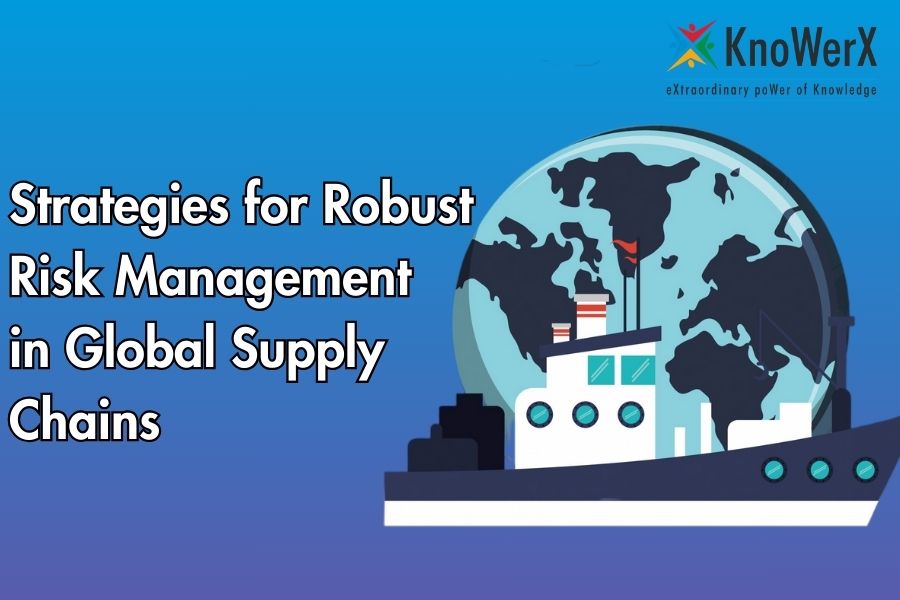Strategic Risk Management in Global Supply Chains

Strategies for Robust Risk Management in Global Supply Chains At KnoWerX, we recognize that in today’s interconnected global economy, businesses rely heavily on complex international networks to source materials, manufacture products, and deliver goods to customers worldwide. These intricate systems, however, are susceptible to a wide array of threats that can disrupt operations, impact financial performance, and damage reputations. Therefore, risk management in global supply chains has become a critical competency for organizations seeking to maintain resilience and continuity amid uncertainty. Risk management in global supply chains refers to the systematic process of identifying, assessing, and mitigating potential threats to supply chain operations. The significance of robust risk management strategies cannot be overstated, as they enable companies to proactively address challenges, minimize disruptions, and maintain a competitive edge in an increasingly volatile business environment. The challenges facing global supply chains are numerous and diverse, ranging from natural disasters and geopolitical tensions to cybersecurity threats and regulatory changes. Developing comprehensive risk management strategies is essential for organizations to successfully navigate the complexities of international trade and logistics. At KnoWerX, we equip supply chain professionals with the knowledge and skills needed to develop and implement these crucial strategies, ensuring their organizations can thrive even in the face of global uncertainties Types of Risks in Global Supply Chains To effectively implement risk management in global supply chains, it’s crucial to understand the various types of threats that can impact operations: Operational risks: These include disruptions to day-to-day activities such as transportation delays, quality control issues, and equipment failures. Effective risk management in global supply chains must address these common but potentially costly disruptions. Financial risks: Currency fluctuations, changes in commodity prices, and supplier bankruptcies fall under this category. Risk management in global supply chains should include strategies to mitigate financial exposure. Geopolitical risks: Trade disputes, sanctions, and political instability can significantly impact supply chain operations across borders. A robust approach to risk management in global supply chains must account for these complex international factors. Environmental risks: Natural disasters, climate change impacts, and resource scarcity pose increasing threats to global supply chains. Incorporating environmental considerations into risk management strategies for global supply chains is becoming increasingly important. Technological risks: Cybersecurity breaches, system failures, and obsolescence of technology can disrupt supply chain operations and compromise sensitive data. As supply chains become more digitized, addressing technological risks is a critical component of risk management in global supply chains. Risk Identification and Assessment Effective risk management in global supply chains begins with thorough identification and assessment of potential threats: Risk mapping techniques: Visual tools like heat maps and bow-tie diagrams help organizations identify and prioritize risks across their supply chains. These techniques are essential for comprehensive risk management in global supply chains. Quantitative and qualitative risk analysis: Combining data-driven assessments with expert judgments provides a comprehensive view of risk exposure. This balanced approach is key to effective risk management in global supply chains. Key risk indicators (KRIs): Establishing and monitoring KRIs enables early detection of emerging threats and trends. KRIs are a crucial tool for proactive risk management in global supply chains. Scenario planning and stress testing: These techniques help organizations prepare for various potential outcomes and assess their resilience to different risk scenarios. They are invaluable for developing robust risk management strategies in global supply chains. Risk Mitigation Strategies Once risks are identified and assessed, organizations can implement various strategies to mitigate them. Effective risk management in global supply chains often involves a combination of the following approaches: Diversification of suppliers and markets: Reducing dependence on single sources or regions can enhance supply chain resilience. This strategy is a fundamental aspect of risk management in global supply chains. Building flexibility and redundancy: Developing alternative supply routes, production facilities, and logistics options provides backup plans in case of disruptions. Flexibility is a key principle of effective risk management in global supply chains. Implementing robust inventory management: Balancing stock levels to buffer against shortages while avoiding excess inventory costs is crucial for risk management in global supply chains. Developing contingency plans: Creating detailed response plans for various risk scenarios ensures rapid and effective action when disruptions occur. Contingency planning is an essential component of risk management in global supply chains. Leveraging technology for risk monitoring: Advanced analytics, artificial intelligence, and IoT devices can provide real-time insights into supply chain risks and enable proactive management. Technology plays an increasingly important role in risk management for global supply chains. Supply Chain Visibility and Transparency Enhancing visibility across the entire supply chain is crucial for effective risk management in global supply chains: Importance of end-to-end visibility: Clear insight into all supply chain stages allows for better risk identification and faster response to disruptions. Improving visibility is a key objective of risk management in global supply chains. Technologies for enhancing transparency: Blockchain and IoT devices can provide secure, real-time tracking of goods and information throughout the supply chain. These technologies are revolutionizing risk management approaches in global supply chains. Data analytics for risk prediction and management: Advanced analytics tools can process vast amounts of data to identify patterns, predict potential risks, and suggest mitigation strategies. Data-driven decision-making is becoming central to risk management in global supply chains. Collaborative Risk Management Effective risk management in global supply chains often requires cooperation across the entire network: Strengthening supplier relationships: Building trust and open communication with suppliers can lead to better risk sharing and joint problem-solving. Strong relationships are a cornerstone of successful risk management in global supply chains. Information sharing across the supply chain: Transparent exchange of risk-related information can improve overall supply chain resilience. Information sharing is crucial for comprehensive risk management in global supply chains. Joint risk mitigation efforts with partners: Collaborating on risk management initiatives can lead to more comprehensive and effective strategies. Partnership is increasingly important in risk management for global supply chains. Regulatory Compliance and Risk Management Navigating the complex landscape of international regulations is a crucial aspect of risk management in global supply chains: Understanding global
